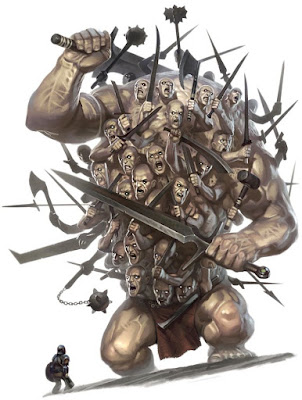BRIAREOS (Briareus) was one of the Hekantonkheires (Hecatoncheires), three primordial hundred-handed, fifty-headed storm giants. He was more specifically a god of sea-storms and in this guise he was often named Aigaion (Of the Aegean). Briareos wed Poseidon's daughter Kymopoleia ("Wave-Ranging") and dwelt with her in the depths of the sea. His two brothers, on the other hand, were appointed guardians of the gates of the storm-pit Tartaros.
According to some Aigaios (Aegaeus) was a storm-giant ally of the Titanes and father of Briareos instead of a just a by-name of Briareos himself.
AEGAEON (Aigaiôn), a son of Uranus by Gaea. Aegaeon and his brothers Gyges and Cottus are known under the name of the Uranids, and are described as huge monsters with a hundred arms (hekatoncheires) and fifty heads. Most writers mention the third Uranid under the name of Briareus instead of Aegaeon, which is explained in a passage of Homer, who says that men called him Aegaeon, but the gods Briareus. On one occasion when the Olympian gods were about to put Zeus in chains, Thetis called in the assistance of Aegaeon, who compelled the gods to desist from their intention. According to Hesiod, Aegaeon and his brothers were hated by Uranus from the time of their birth, in consequence of which they were concealed in the depth of the earth, where they remained until the Titans began their war against Zeus. On the advice of Gaea Zeus delivered the Uranids from their prison, that they might assist him. The hundred-armed giants conquered the Titans by hurling at them three hundred rocks at once, and secured the victory to Zeus, who thrust the Titans into Tartarus and placed the Hecatoncheires at its gates, or, according to others, in the depth of the ocean to guard them. According to a legend in Pansanias , Briareus was chosen as arbitrator in the dispute between Poseidon and Helios, and adjudged the Isthmus to the former and the Acrocorinthus to the latter. The Scholiast on Apollonius Rhodius represents Aegaeon as a son of Gaea and Pontus and as living as a marine god in the Aegean sea
According to some Aigaios (Aegaeus) was a storm-giant ally of the Titanes and father of Briareos instead of a just a by-name of Briareos himself.

Comments
Post a Comment